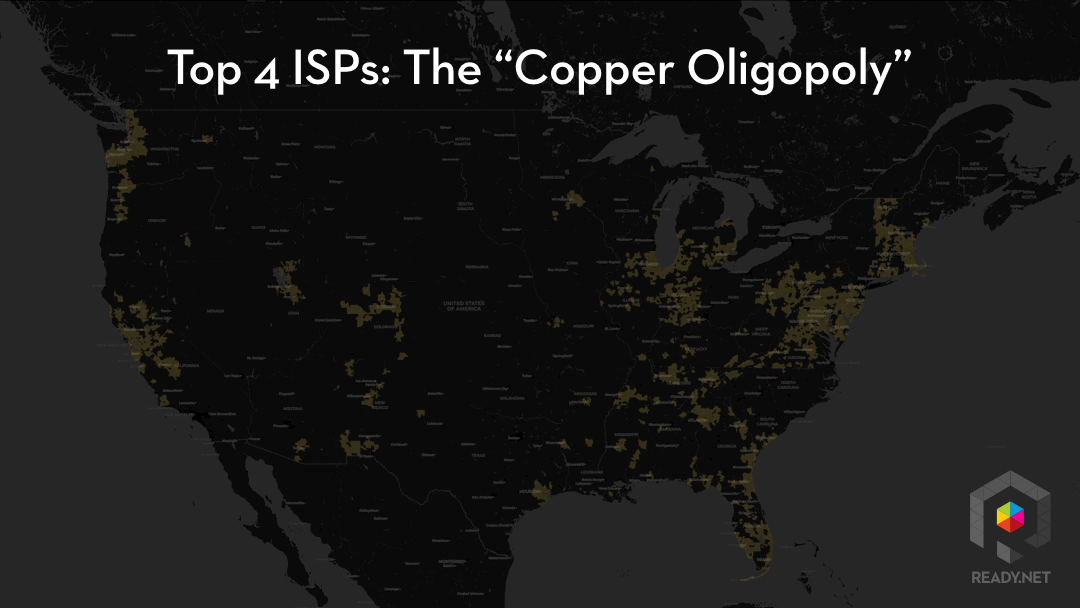For starters, you’ll make more money.
This open letter originally appeared on Broadband Breakfast.
Greetings Gwynne, Elon, and Team Starlink –
Thank you for working to connect folks. You’re launching the greatest leap forward in the internet’s 50 year history, and will recast the incumbent structure of U.S. telecom over the next few years. Today’s widespread denial of this fact is a protective slathering of fear, uncertainty and doubt. Disruption can be unpleasant business for oligopolies.
Please make the most of your shot. Don’t become the world’s largest ISP by going direct-to-consumer. For the sake of Starlink’s shareholders, for Americans, and for our nation’s thousands of local ISPs:
Please offer Starlink as open access, wholesale backhaul for America’s local ISPs.
The Swedes, approaching 95% fiber-to-the-premises, yet half the population density of the U.S., showed us the best model: open access last kilometer, offered wholesale via neutral operator (WNO). ISPs compete to serve subscribers over shared infrastructure, all the way into the homes.
That model can and should become the default in the United States, available to local ISPs, where today the outmoded vertically-integrated operator model reigns supreme, shackling subscribers to outdated copper that pretends to be more capable than it really is.
Our copper oligopoly does what any rational cartel does to protect profits. They write state and local rules preventing threats like open access from spreading. They hoover up billions of public dollars each year, funneling proceeds into a combination of self-congratulating dividends and marketing campaigns designed to thoroughly suppress honest local ISPs. But they do not waste perfectly good cartel cashflow upgrading our nation’s information infrastructure.

They are too strong now for local ISPs to do anything about. They fight dirty against local ISPs, and in so doing keep tens of millions of us shackled to shoddy copper, inadvertently preventing our nation from joining the digital services era.
They are at the time of this writing too big to fail.
You – Gwynne, Elon, Starlink Leadership – could be the deciding factor between whether we in America remain stuck in the dark era, or if we, too, can enjoy the benefits of the coming Cambrian explosion of digital service innovations.
How? Bring open access to America. Offer Starlink wholesale, open access, delivered to subscribers through competitive local ISPs.
Even though it looks different from the direct-to-consumer model that works so well over at Tesla, you’re almost certainly already leaning this direction. You have some of the world’s top talent on team, no doubt you’ve already modeled all possible approaches. So you likely saw that wholesale neutral open access offers the path to global maximum ROI for you, the infrastructure owner. The accretive economics of multiple service providers competing to deliver price-discriminated digital services over your infrastructure, minus the outsourced cost structure of service delivery, maximizes the value of your asset.
But, just in case: here are three reasons to please be an open access, wholesale neutral operator in the U.S.
#1: It’s best for Starlink
You’ll generate more profit. It might take slightly longer than the near-instant retail gratification of turning on the one ISP to rule them all, but wholesale neutral open access offers the path to achieving global maximum ROI.
Just as important as maximizing profit is your culture and legacy. Like all Elon Musk companies, Starlink exemplifies definite optimism. You incite imaginations, and summon the full brilliance of smart people working hard within a culture of innovation. If you join the U.S. telecom oligopoly, or – more likely, given the devastating potency of Starlink’s tech and team – become their dank meme overlord, you’ll lose your innovative edge.
With Tesla, Boring Co, Hyperloop and every prior endeavor, you’ve shown that it’s possible to do exceedingly well financially by doing good in the world. As the world’s largest ISP, you’re just the new asshat to blame when WHY THE F*C&K WON’T THIS F&%ING WEBSITE LOAD — F&^K YOU STARLINK!!!! !
At least in the context of U.S. broadband, direct-to-consumer is both financially sub-optimal, and at odds with the ethos of all other Elon Musk endeavors.
#2: It’s best for American subscribers
Open access, wholesale Starlink offered via local ISPs helps all Americans.
Once you’re fully launched – 2022? – high speed broadband will be everywhere in America. With game-changing latency and speed, Starlink holds great potential to accelerate America’s entry into the digital services era. In Sweden, where they are already advancing into digital distributed healthcare, in which many forms of care are administered in-home, now that the information infrastructure is in place.
Digital services will save America hundreds of billions of dollars per year in healthcare and transportation costs, and profoundly enhance the quality of life for millions of Americans. Such digital services that cannot properly flow through copper, nor many of today’s fixed wireless networks. Most such services can easily flow through your global infrastructure.
As wholesale backhaul for local ISPs, local ISPs can upsell and cross-sell such digital services to subscribers. And you don’t put folks in the awkward place where they need to leave their local ISP – especially in remote America, often someone they hold long ties with, bonded by the ocean of uninhabited terrain separating their community from the rest of the world. Subscribers have someone local to talk to when things go wrong.
#3: It’s best for America’s Local ISPs, and the communities they serve
The potential reality just ahead is sobering for those who dare to look. The fate of the local ISP remains to be seen in the Starlink era of internet access. The amount of challenges local ISPs take on every day means most are unaware of the profound change you’re about to unleash. Of those aware, most I’ve spoken with at Ready.net seem in denial. A small but growing number are understandably worried that the end is near.
There are nearly 3,000 ISPs in the U.S. When they realize the eminent threat, when your shadow passes overhead, when adrenaline sharpens their eyes and their minds and they pause the hard work of keeping their community connected long enough to react, which question would you rather they ask?
“Is Starlink the end of my business?”
Sure, you could wipe most of them off the face of the earth, after they’ve worked for years or decades to get folks connected.
“How can I grow my business through Starlink to serve more subscribers?”
Or, you could give them a potent tool with which to compete against the cable incumbents.
By empowering local ISPs, you’ll help human-scale ISPs win their constant battle against the copper oligopoly. Local ISPs are the ones fighting mediocrity in telecom infrastructure. They’re the ones working to solve difficult problems, with limited resources. They’re the ones physically, socially, economically tied to their community. If you’re wholesale open access, you help them win. In turn, they’re your built-in salesforce and customer service, capable of thoroughly ensuring access for all.
You could empower thousands of small businesses, cooperatives, municipalities, and nonprofits who’ve worked for years to get folks ready for the digital services. Here are just a few examples among the nation’s thousands of local ISPs:
1. Aroostook Technologies, the fixed-wireless ISP in far northern Maine, a locally-owned IT business operating since before the internet was born. They’ve connected thousands of Mainers, but routinely turn away prospective customers due to physics constraints of their slice of spectrum within Maine’s heavily forested, hilly terrain. What if they could activate thousands more of their neighbors with always-on, any-line-of-sight via Starlink backhaul?
2. Innovators like Althea, working to bring new P2P models of access to life on the ground for community-owned networks. What if the creative problem-solvers of the WISP and mesh network communities could serve over your infrastructure, consuming it as a resource, as software startups today utilize AWS? You might enable the Cambrian explosion of all-new distributed digital services.
3. Our nation’s 800+ Rural Electric Cooperatives – the same unsung heroes who’ve worked to ensure continuous access to electricity for millions of rural Americans since the early 20th century. Now, many RECs offer broadband to their members, like United Electric (where my Ol’ Man worked for decades!), which now serves United Fiber to 11,000 subscribers and growing. They’re the reason you can get superior internet in my rural hometown Maryville, Missouri, than anything I can get living in San Francisco. There are over 100 RECs today with active fiber services, and many more in the works. RECs make exceptionalISPs, and offering internet service helps them serve their members. Some RECs who were looking to implement internet service are reluctant to proceed with their plans to deploy fiber, awaiting whether Starlink will potentially strand tens or hundreds of millions of dollars of their assets.
Conclusion
You’re about to massively upgrade the internet. Americans want to work with their local ISPs. Local ISPs can help you connect more folks and deliver more digital services. Please offer Starlink as wholesale backhaul to our nation’s thousands of local ISPs.
You’ll unleash the full potential of the internet in America, once and for all. Since we now live in the connected economy, at the dawn of the digital services era, that means open access Starlink unleashes the full potential of America.
By way of background, Ready.net helps local ISPs grow. There is extremely high demand for Starlink backhaul. We’d love to work with you to make that a reality.
With or without us. Please use your superpowers for good.
No matter what, thank you again for connecting folks.
Jase Wilson
Founder, Ready.net
Twitter: @jase
Thank you Mike Faloon, Drew Clark, Darren Farnan, Zhuangyuan Fan, Deborah Simpier, Jess Masse, my parents Steve and Traci, my girlfriend Xueying, and cats Jackson and Franklin for contributing to this letter, as well as America’s thousands of local ISPs for keeping folks connected. #ThankYourLocalISP
